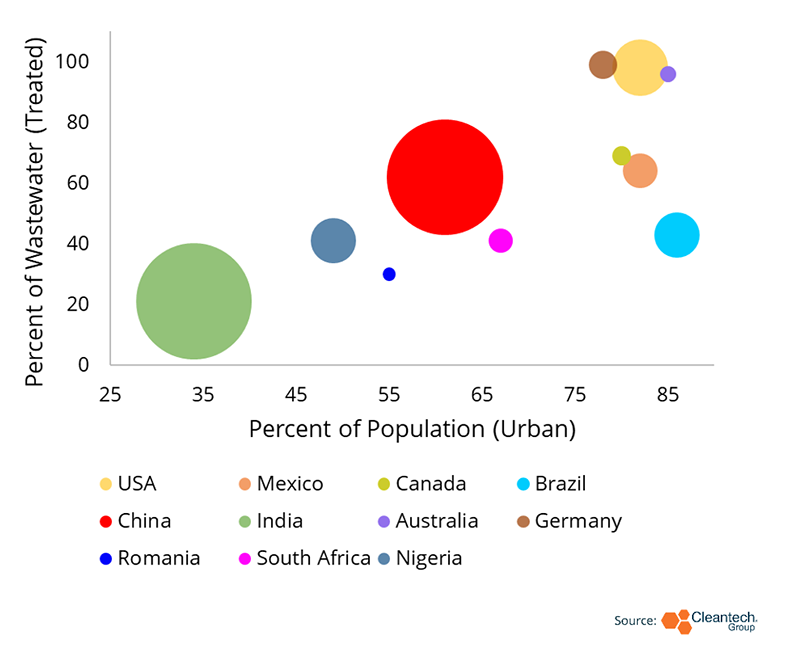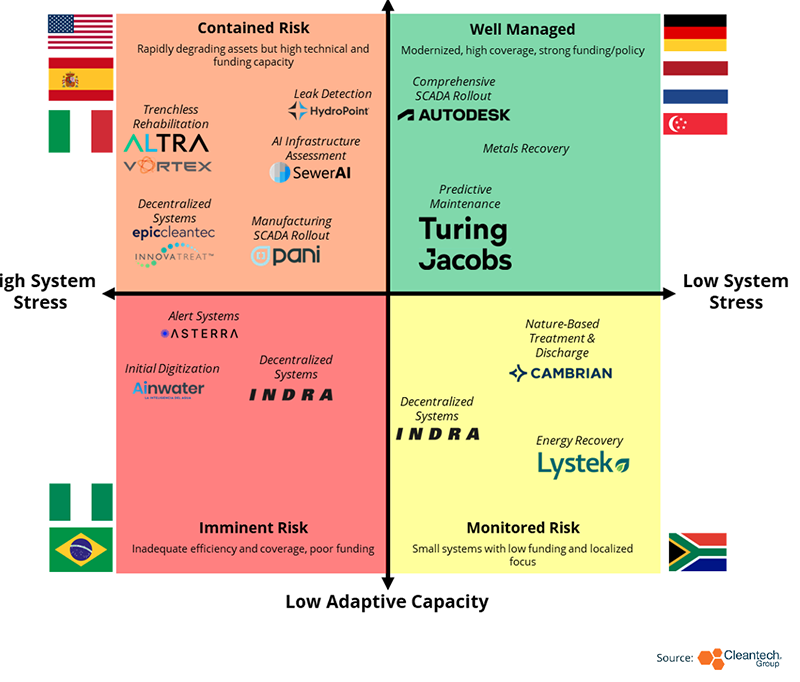Globally, 80% of wastewater returns to ecosystems with none therapy or reuse. A big share of this air pollution is from creating nations like India, China, and Indonesia with out widespread wastewater programs. Developed wastewater programs like Israel and Singapore present water reuse and superior therapy applied sciences throughout their populations. Whereas creating nations lack intensive infrastructure, nations like Israel and Singapore should fastidiously preserve intensive piping and high-stress therapy crops.
Infrastructure life expectancy will not be a precise science, however mass failures instantly enhance in older, decaying programs. This distinctive ache level is exacerbated in equally rich however a lot bigger and fewer city nations just like the U.S. or Germany.
Whereas creating nations produce the majority of wastewater air pollution and endure results like cholera, dysentery, typhoid and polio, developed nations’ infrastructure are approaching catastrophe via age-related failure. Additional difficult by distinctive rural/city points, every nation has particular wastewater challenges {that a} suite of technological improvements can resolve.
Market Sorts
Wastewater programs will not be uniform however tailor-made to fulfill the precise regulatory requirements and calls for of communities. For that reason, wastewater innovation have to be grounded in market context. Profitable wastewater programs are quantified by their ratio of handled waste to complete quantity of wastewater produced. Traditionally, this ratio correlates with urbanization, municipal authorities growth, and financial growth. But, many nations like Brazil and Nigeria are urbanizing sooner than their municipal governments can assemble wastewater programs. Determine one represents this pattern of non-linear growth.
Determine 1: Extent of Wastewater Therapy by Nation

The U.S. created expansive wastewater requirements via the Clear Water Act. Twenty-five years later, American wastewater is a mannequin for intensive city/rural infrastructure and rigorous therapy requirements. Sadly, the system is getting old quickly. The U.S.’s wastewater infrastructure would require funding and repairs totaling over $412B within the subsequent twenty years.
Over 20% of pipes have exceeded their meant lifespan and have to be changed, a staggering 452,000 miles of pipe. Related developments are occurring globally in developed economies like New Zealand, the UK, Spain, and Italy. Every of those examples battle with funding repairs with out vital will increase on utility charges, driving rigidity between charge payer and municipality.
These two developments are radically completely different and separated by system stress and innovation capability. System stress is a measure of pressure and/or degradation in wastewater infrastructure whereas adaptive capability refers to a wastewater system’s capability to reply to technological or coverage innovation. Determine 2 charts these metrics and corresponding niches of rising technological innovation.
Determine 2: Wastewater Expertise Market Matches

Most improvements originate within the excessive adaptive capability markets as they’re extra prosperous and have extra formidable water high quality requirements. Novel applied sciences then set up outlined product-market slot in excessive system stress markets as they trickle all the way down to creating economies.
Two distinct however extensively relevant developments emerge from this evaluation:
1.) Decentralized therapy programs
2.) Software program in infrastructure and system administration
Decentralized Wastewater Therapy
Decentralized or distributed wastewater programs function with out direct integration into standard wastewater grids. These programs can deal with and recycle water on-site at increased effectivity than giant municipal amenities.
Decentralized programs excel in treating constant waste streams, making them an optimum candidate for modular functions in business, residential, and industrial functions. The core expertise goals to copy the efficiency of conventional, municipal wastewater providers at a smaller scale tailor-made to site-specific water high quality and human interactions.
Determine 3: Epic Cleantec Diagram
 Supply: Epic Cleantec
Supply: Epic Cleantec
Decentralized therapy is a novel expertise with rising functions in city and creating markets. City markets are notably enthusiastic about decentralized options on account of contentious relationships with municipalities growing utility charges. Salesforce Tower in San Francisco now saves over one million {dollars} a 12 months with a decentralized therapy system whereas additionally producing income from soil amendments extracted within the therapy course of.
Whereas this pattern is concentrated in rich city facilities like Los Angeles and San Francisco, product market match is calcifying in creating states. Indra’s India installments embrace industrial, rural, and concrete functions, typically implementing the location’s first wastewater therapy system. A real 0 to 1 expertise, Indra’s modular items additionally provide great flexibility for governments aiming at strategic wastewater initiatives, particularly in nations like India with accelerating energy grids.
Whereas innovators like Innovatreat have discovered nice success in rural initiatives within the U.S., these rising functions in city and creating markets should overcome particular challenges in scaling options. In city markets, a transparent owner-operator dynamic and provide chains haven’t been established. Some buildings choose to cross accountability off to native operators whereas different constructing managers refuse any oversight.
Equally, expertise integrators like Epic Cleantec don’t manufacture their very own reactors, limiting their development and putting them in competitors with their very own companions. Within the creating markets, it’s typically solely via authorities initiatives that schooling, group, funding, and energy entry are developed alongside decentralized programs. Extra a difficulty for rural markets than city markets, return on funding is exceptionally tough to gauge on account of distributed populations and no proof of product-market slot in areas with none historical past of wastewater therapy.
Software program, Effectivity, and Infrastructure
Rising software program options analyze wastewater operations and repairs, growing system effectivity, extending the lifespan of getting old infrastructure, or expediting overdue repairs.
Instruments right here could be consolidated into two distinct classes:
1.) AI infrastructure inspection
2.) Automated facility administration
AI in infrastructure evaluation presently focuses on conveyance evaluation and defect detection with these two fields incessantly overlapping. Conveyance evaluation makes use of cameras or sound waves to establish leaks in wastewater programs for restore. Whereas it sounds minor, conveyance losses, particularly in older, developed wastewater programs, can waste upward of 12% of complete water quantity or unfold sewage into ecosystems. Innovators like Hydropoint have been particularly profitable in giant company or college properties with numerous water use that’s tough to observe.
Defect detection, whereas aside from conveyance evaluation, applies to a variety of wastewater system points. SewerAI is essentially the most outstanding innovator within the U.S., gaining vital traction from a joint undertaking with town of Houston and the EPA. Utilizing their proprietary pc imaginative and prescient platform, SewerAI data the insides of pipes, stiches the photographs collectively, after which analyzes the system for cracks and decay. Automated sewer evaluation reduces handbook evaluation time by 70%, will increase detection by 33%+, and lowers day by day operational value from $1,000+ to lower than $300. Really revolutionary in accuracy, value, and velocity, using AI in infrastructure evaluation could possibly be the precise surge teetering wastewater programs’ have to unleash wanted infrastructure substitute and retrofits.
Automated facility administration is a much less dramatic however extra contentious enchancment. Largely borrowed from industrial manufacturing amenities, automated programs consumption sensor knowledge on water high quality, anticipate incoming waste, and carry out the job of a managing engineer to maintain the ability operational. One other distinctive utility of automation, these programs are notably useful in getting old amenities or elevated regulatory scrutiny.
Municipal amenities stay hesitant to trial these programs on account of quite a lot of causes regardless of the low value. A chief cause for hesitancy is the proprietary nature of those software program programs. Municipal wastewater amenities are exceptionally reluctant handy over management to algorithms with out guiding them or enhancing them, however software program suppliers consider these edits might result in air pollution occasions and authorized legal responsibility. Past points in accessing the related expert laborers, this management/legal responsibility dynamic has but to be absolutely addressed and can restrict development.
Maybe the most effective reference for achievement right here is the usage of hydrological simulation software program during the last ten years in Mixed Sewer Overflow (CSO) programs. The system works to foretell potential sewer-rainwater contamination episodes and automate administration. Speedy implementation and transparency with software program programs between suppliers and amenities decreased the assessed want of American CSO programs by over 30% in ten years.
Takeaways
No matter system stress or adaptive capability, no expertise will save a wastewater system from poor administration. Governments like Israel, Germany, and Singapore have excelled, constructing intensive and superior programs intently mirroring the U.S. The place nations just like the U.S., Italy, and Spain should deal with is mobilizing software program to increase getting old infrastructure’s lifespan via restore, substitute, and automation of operations. On the opposite facet, the thriving programs talked about, and some different European states should stay diligent of their system repairs and evaluation to keep away from a backslide right into a high-stress system.
Decentralized programs current essentially the most distinctive pattern on this ecosystem. American wastewater utility charges rose 79% within the final decade, a pattern that can push extra city purchasers towards decentralized programs. Actual property developments are tightening management over buildings by putting in decentralized programs and saving hundreds of thousands doing so. The draw back is considerably tougher allowing processes slowing growth velocity and general novelty of the market outlined by low product differentiation.
Growing nations are in a extra simple scenario with decentralization. With out vital infrastructure linking rural and concrete communities, decentralized programs provide a method to quickly enhance wastewater requirements. Figuring out optimum market-fit in rural programs stays a problem and will probably be important in bypassing conventional steps in wastewater system growth. Mobilizing knowledge and restricted types of system automation must also be a precedence for nations with increased adaptive capability.



